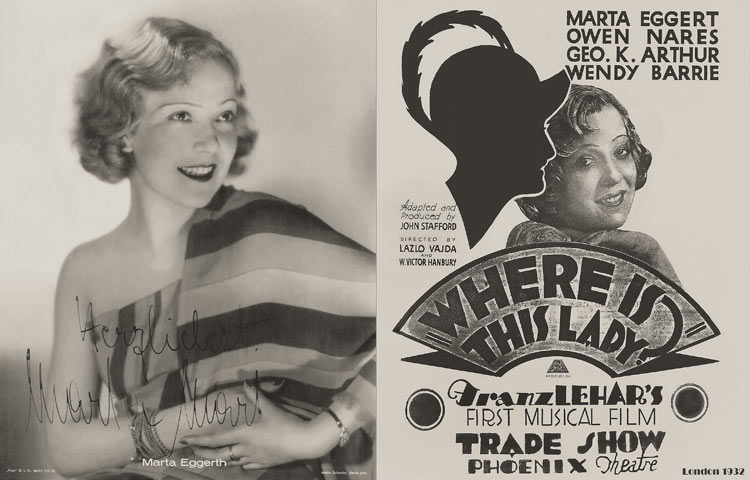The Fascinating Story of Marta Eggerth and Film Director Ladislao Vajda

Watch video trailer below, "Where is this Lady?".
This entertaining video includes a scene where Marta Eggerth is selling tickets for her father's Tour Bus in Vienna:
Marta Eggerth 1932 Film: "Where is this Lady"
Music written by Franz Lehár. English version of Es War einmal ein Walzer
Book: Billy Wilder, John Stafford, Sydney Blow
Ladislao Vajda's first film as Director. Famous films include the 1955 film "Marcelino Pan y Vino" "the Miracle of Marcelino". la primera película de Ladislao Vajda como "director". Famoso entre muchas por la película "Marcelino Pan y Vino" (1955)
'How I knew Ladislao Vajda in Spain'
A personal story by Jane Knox-Kiepura
As a short personal introduction I would like to thank the Hungarian born Ladislao Vajda in a very special way. Growing up in a television-free Spain in the 1950's it was also rare that we were able to go to the cinema. It happened that Ladislao Vajda's eldest son was at our international school in Madrid. When his father's famous film "Marcelino Pan y Vino" came out in 1955 we were all allowed to see it. It was very exciting and we were in great awe. The son was in my older sister's class and she remembers him well. A wonderful family.
We lived close by to the Chamartin film studios just outside Madrid where many of Vajda's films were made including the famous "Marcelino" - it was fascinating watching the activity through the lattice walls when we went "pasenando" on those beautiful sunny days in beautiful Chamartin where the smell of roses filled the air. It was a huge surprise decades later to find out that he, along with the famous cinematographer Heinrich Gärtner who became Enrique Guerner, had made movies with my mother-in-law Marta Eggerth. Vajda, and Gärtner had both fled Nazism, finally settling in Spain and continuing to make movies together.
Marta Eggerth would have known Laszlo Vajda and his parents from Budapest, Vienna and Berlin from the very early days. The first time Marta actually worked directly with the son Laszlo Vajda Jr. was in Berlin on the Franz Lehár, film "Es war einmal ein Walzer" - "Once there was a Waltz" Laszlo Vajda is listed in the credits as Schnitt/Editor: L. Vayda, but clearly, he was much more than an editor. The misspelling of his name in the film credits is unfortunate.
When the film was destined for London the Evening Standard of August 1 1932 exclaimed:
"News reached me that a talkie for which Franz Lehar, composer of "The Merry Widow," has specially written the music, is to be produced in England next month. The picture under the title of "Once upon a Time There was a Waltz," has already been made in Germany by the firm of Aafa. Amalgamated Films are also planning to make bi-lingual productions here for which German casts, directors, and certain technicians will be brought over, to work in conjunction with the British production unit. For this first picture, "Once Upon a Time There Was a Waltz: Laszlo Vajda, Aafa's crack director, will come to England to advise and assist on the British version. He is bringing over with him Marta Eggert, an English-speaking Hungarian actress who has been assigned the star role in the picture. Marta is as yet unknown to British audiences but the success she has won in Germany is such that she is regarded as the girl best entitled to step into Lilian Harvey's shoes when that star goes to Hollywood shortly."
It is interesting to note the expression "crack Director" - this would indicate that he was known already to have been a very talented Director of films but have not been able to find evidence of this from published sources. The British expression "crack" meaning "brilliant".
Per the poster above the film would eventually be called "Where is this Lady" - Not only was the music for this film written by the famous Operetta composer Franz Lehár but the "book" was written by Billie Wilder who became the famous Billy Wilder of Hollywood fame.
Laszlo Vajda was already very familiar with the Elstree Studios as he had already worked on two musical films there:
1930 - Zweimal Hochzeit - E. W. Emo, Composer/Music Hans May. (11 July 1886 - 31 December 1959) with Gertrude Kohlman, Paul Morgan , S.Z Szakáll Vajda as Sound Mixer
1931 - Beggar Student - Der Bettelstudent - Composer : Carl Millöcker (1842 - 1899) with Jarmila Novotna and Hans Jaray. Vajda as Editor
1932 - Where is this Lady? As Director - British version of Franz Lehar's 'Es War einmal ein Walzer". Vajda first film Director.
Laszlo Vajda was born in Hungary on August 18 1906 - he died tragically young in Barcelona Spain on March 26 1965.
As far as is known, Laszlo Vajda's father, a famous screenwriter, was born Laszlo Weisz - born 19th August 1877 in Hungary. He died 10 March 1933 in Berlin. According to the biography by Francisco Llinás "El hungaro errante" - Ladislao Vajda's mother had come to live with the Vajda family in Spain after 1956.
Ladislao Vajda was clearly one of Europe's most significant Directors prior to his death in 1965. He had made films in eight countries and was highly respected and certainly has not received internationally the recognition due to him.
More to follow in Part 2 of this story.Written and researched by Jane Knox-Kiepura for Patria Productions.
